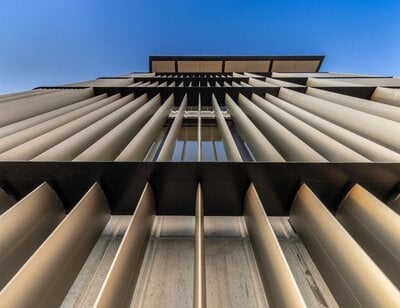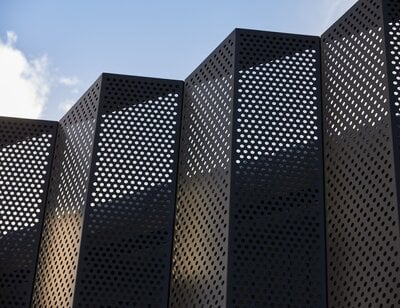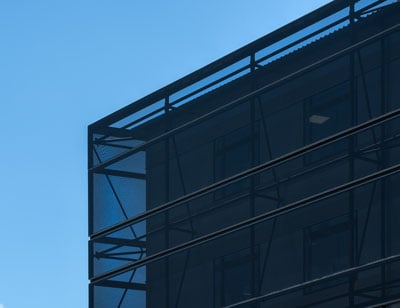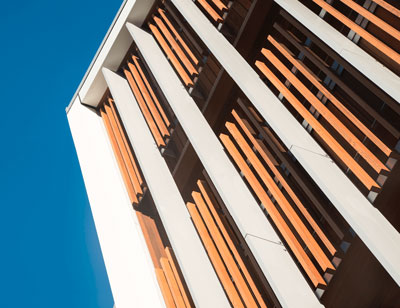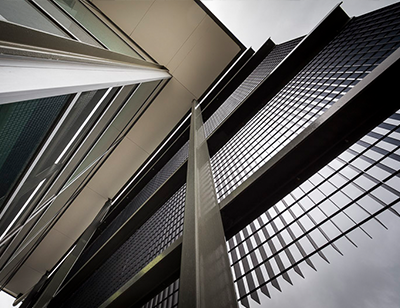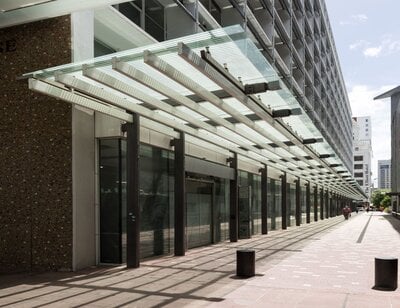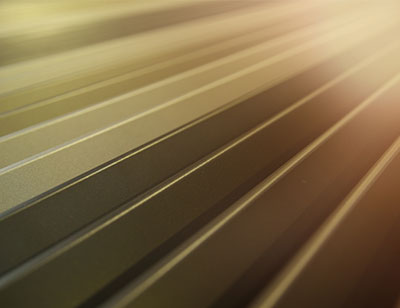'I think privacy is the last true luxury' Valerie Plame
That might be just true. There's a deep-rooted psychological need for privacy. A need that is inextricably linked with our need for a home. Combined, this makes the humble home not just a basic need but arguably one of the most important needs, along with food, water and air. We need a home because it allows us to unwind, to relax and be ourselves. It's a chance to remove the masked self that society sees, even if we do only get to remove that mask for a fleeting few hours every evening.
Which means a great big window next to your comfy chair might be ok if it looks out onto the garden. But not if someone on a nearby balcony can look in and see you 'unmasked' (so to speak). As housing becomes more dense and hotels continue to be built at a pretty quick (albeit slightly slower post-covid) pace, the need for privacy becomes more apparent. But why exactly?
Why We Need Privacy
One of the key psychological reasons for privacy is it allows us to develop and maintain our self identity. Away from the constant gaze and judgement of others, we can relax and express ourselves, building our sense of self and reconnecting with ourselves. Even if that simply means wearing those novelty slippers, eliciting an inner chuckle every time cold toes slip into them.
There's also something in feeling safe and secure. We still have our animal instincts and just as a pet Guinea Pig will retreat into a little plastic dome to hide, we like to retreat into our own homes. Sure, our threats and stresses are more subtle. There's no giant's hand reaching in to feed us a carrot like there is with the Guinea Pig but the big hand of society touches and influences nearly everything we do.
Maybe it's a control thing. After all, your home is your castle, the one place you can rule with an iron first, where everything you say goes. Unless you have children, in which case you're mostly an observer to chaos. But hey - at least privacy allows you to hide that chaos from the world.
There's another reason for privacy too. It allows us to spend quality time with our partners. That doesn't just mean what you think it means either. It means sharing private information and opinions, away from the gaze and ears of others. Relationships and connections flourish away from the interference of daily lives.
Privacy in Apartment & High Density Housing
One of the most common problems in apartment complexes is the 'goldfish bowl effect', where occupants feel under the constant gaze of those outside. This can be particularly problematic in bedrooms overseen by multiple apartment windows.
Classic house design has the bedrooms elevated on the first floor. The view form the street is partially obscured by the angle (unless floor to ceiling windows are present) and folk on a similar level tend to be in their bedroom and, presumably, with better things to do than stare across the street at others. In apartment complexes it is considerably easier to look over the top of your bowl of breakfast cornflakes, out of the window and into the bedroom of Mrs Jones on the adjacent block.
The need for outside space and fresh air often means many complexes have balconies. These balconies also introduce a problem in terms of being overlooked by occupants nearby at a higher level, or maybe from those below also. For this reason, it's not uncommon to find balconies have strategically placed pot plants or other forms of 'visual shields'.
So we need privacy. But we don't want to close the curtains all day, every day. That would be no good as sunlight is like a ray of you know what. Maybe frosted windows are a consideration but that would feel like living inside a toilet, so not ideal. So what's the answer for medium to high density apartment complexes? How do they integrate communities into a smaller space whilst maintaining individual privacy?
Privacy Options in Apartment Complexes
A number of design principles have been developed which can add privacy. For example, the use of recessed or semi-recessed balconies as opposed to cantilevered. This would offer some degree of both visual and acoustic privacy, greatly improving the livability of the outdoor space. More importantly, there will be a number of compliance requirements specific to the location of the building. For example, the Auckland Unitary Plan details a number of standards to be applied to all buildings for a resource consent to be issues. This includes; 'manage the effects of developments on adjoining sites, including visual amenity, privacy and access to daylight and sunlight and achieve high quality on-site living environments'. This demonstrates privacy is a consideration, as is light etc. 'High quality' might be open for different interpretation but we'd assume part of that would include the need for privacy. In which case the following options should be considered:
Louvres
The addition of louvres to a window or balcony can achieve the desired levels of privacy, whilst importantly retaining both access to the sunshine and the exterior views. Positioned correctly, the louvres will offer the necessary degree of solar control, providing the shading needed for passive solar control. Then there's the issue of prying eyes. Louvres are very good at restricting views if the interior, whilst proximity to the louvres allows for relatively unobstructed views of the outside for occupants. It's a clever trick that works.
Perforated Screens
An alternative is the use of perforated screens and a sliding mechanism. The ability to manipulate the screens offers an opportunity to increase/decrease levels of privacy (and shading) as desired. It's this ability that particularly appeals. After all, some days it's nice to open up to the world. On others, it's more desirable to shut out everything and everyone. The ability to decide as you see fit on any given day is a good thing.
Curtains
For windows, there is also the option of curtains. We note, the addition of either these does not necessarily prelude the use of louvres or screens as well. In particular, curtains work well with louvres as their purpose really is different. They are used for total privacy, when we want to restrict the ingress of light and really isolate ourselves from the outside at night-time. During the day, curtains can do the same thing if needed. But there's a limitation too - its total privacy or nothing. And total privacy means you can't see out either. Curtains also have limitations if the intended use is for solar control as the hear has already made it inside. It's like letting the opposing army get across the moat to the castle. It just makes everything that bit harder.
Blinds
Blinds (so inside louvres then) similarly have some strengths and weaknesses. They suffer from the same problem of letting the heat in through the window so there are drawbacks when it comes to solar control. For privacy, the ability to manipulate blinds is advantageous and they're obviously able to completely shut out the outside if needed. So blinds make for a solid option, although if we're completely they are a complete pain to have to clean and are susceptible to 'little hands' breaking them. This is probably why you don't see many blinds in hotels.
Overall, the best privacy apartments and/or hotels are those which work without having to think about it, For us, that has to be the use of louvres. We say this from experience and knowing they are generally ignored, or not consciously seen by the occupant. Sure, we want our work to be seen and appreciated but the best solutions are those which you forget about existing as they become part of everyday life. It's like that Bluetooth connection between your phone and your hands free in the car, It connects and works without you thinking. And that is just perfect.

